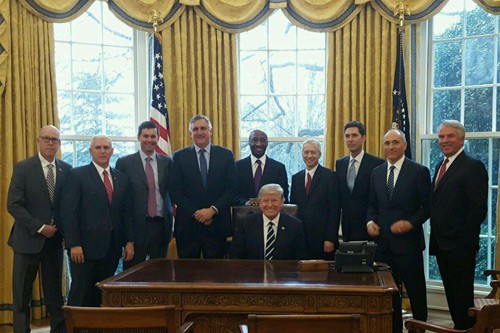
CEOs from Lilly, Merck & Co, PhRMA, Novartis, and Celgene’s executive chairman with President Trump and aides
Pharma executives got their wish for an early meeting with President Trump yesterday, a couple of weeks after he accused the industry of “getting away with murder” on drug pricing.
There was little change in the rhetoric coming out of the White House, with Trump turning to the topic of medicine pricing at the outset of the meeting, saying that “astronomical” prices are being charged for medicines.
“We have to get prices down for a lot of reasons. We have no choice,” Trump told the pharma pack, which included Pharmaceutical Research and Manufacturers of America (PhRMA) CEO Stephen Ubl, and the head of Novartis, Merck & Co, Eli Lilly, and Celgene.
Too many pharma companies are making medicines overseas – which he blamed on regulation, and overseas “money supply and devaluation”. Also in Trump’s sights is what he described as “global freeloading” – foreign price controls on drugs that reduce the resources of US pharma companies for R&D. Other countries should “pay their fair share for US-manufactured drugs”, he asserted.
Trump counterbalanced the tough talk by reiterating his pledge to reform the regulatory process so that new medicines can be approved much more quickly, and changing the circumstances in which experimental drugs can be used in patients. In particular, he said it should be easier to test new drugs in terminal patients.
“We’re going to be cutting regulations at a level that nobody has ever seen before,” said the President – while insisting that protection for the public will be as good and “maybe better” than at present – and reducing taxes to encourage firms to relocate back to the US. A decision on the new FDA Commissioner would be announced “very soon”, he added.
The promise of looser regulation may appear to play to the pharma gallery at first glance, but in reality the industry has been alarmed by the initial moves in this area – including an executive order this week that calls for federal agencies to withdraw two regulations for every new regulation they introduce.
The “one in, two out” rule also insists that any new regulation must be zero costed, unless special dispensation is gained from the Office of Management and Budget (OMB) or additional cost is required by law.
Adding that to a second order implementing a federal hiring freeze – and a lack of detail in both cases – and serious questions are being raised about the ability of the FDA to function effectively. In particular, there is concern that the orders could effectively stop the 21st Century Cures Act – one of the last actions of the Obama administration and widely welcomed by industry – in its tracks.
Nevertheless, industry reaction to the meeting seems optimistic. Ubl tweeted after the meeting that the discussions with Trump had been “positive [and] productive”, adding that PhRMA wants to work with his administration on market-based reforms to improve access to and affordability of medicines.
The President’s agenda on taxes, trade and regulations “could create 350,000 American jobs over 10 years due to biopharma industry growth,” he added.




